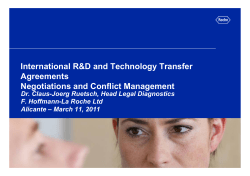
DIES-INTERNATIONAL DEANS` COURSE LATIN AMERICA 2015/16
Announcement and Call for Applications of the DIES-INTERNATIONAL DEANS’ COURSE LATIN AMERICA 2015/16 The German Academic Exchange Service (DAAD), the Universities of Alicante (Spain) and Saarland (Germany), the German Rectors’ Conference (HRK), in cooperation with the Alexander-von-Humboldt Foundation (AvH), are jointly organising the DIES-International Deans’ Course for Latin America. This intensive training course is part of the DIES programme (Dialogue on Innovative Higher Education Strategies) which has been jointly coordinated by the DAAD and HRK since 2001 (www.daad.de/dies). Saarland University and the University of Alicante are the academic coordinators of the course. Both institutions have been cooperating for a long period of time, including projects for the evaluation, development and improvement of university management in Latin American higher education institutions. Course Content, Methodology and Schedule The key objective of the course is to bring together a group of about 25 newly elected Deans and Vice-Deans from Universities in Belize, Bolivia, Chile, Colombia, Costa Rica, Cuba, Dominican Republic, Ecuador, El Salvador, Guatemala, Honduras, Mexico, Nicaragua, Panama and Peru in order to enable the participants to tackle the challenges of holding a deans’ position. Issues such as Strategic Faculty Planning, Financial Management, Quality Management and Human Resources Management will be key parts of this course, which will also include a soft skills workshop. The course will be conducted in English and Spanish. Methodology will be strictly practice oriented and mainly based on case studies. Personal experience as a university manager will greatly contribute to this course and active participation will be necessary. Participants are expected to develop a Strategic Action Plan (SAP) for their own faculty, which will comprise the characteristics and strategies for the faculty, the role of the dean and the underlying administration and procedures in the thematic areas of the course. In this framework, participants will develop and work on concrete measures to implement the strategy in their own faculty. The basic elements of the SAP will be introduced in the first part and the continued work on the SAP will be supported by distance coaching and via online webinars (Part II). Part III will offer participants the opportunity to reflect on the implementation of their faculty strategy and other reform projects discussed by the participants during parts I and II. Page 1 The following list shows the dates of the presence and online modules: Module 1: Sept 21st to 25th, 2015 in Alicante, Spain (plus necessary travelling time) Module 2: Sept. 28th to Oct 2nd, 2015 in Saarbrücken, Germany (plus necessary travelling time) Webinars: Online seminars between November 2015 and February 2016. Module 3: April 4th to 8th, 2016. As the three parts of the International Deans’ Course are interconnected, participants need to confirm prior to the acceptance to the course that they are able to take part in all three parts. Participants’ Profile - Participants need to hold the position of a Dean or Vice-Dean. Other positions such as Vice-President of Head of Department are only eligible in cases where the level of faculties does not exist. Applicants from administrative units are not eligible. - Participants are aged preferably between 40 and 50 years; - Active and excellent English and Spanish language skills (speaking and writing) are indispensable; - Being a DAAD- alumnus will be considered an asset, but is not compulsory; - Participants from universities of the following countries are eligible to apply: Belize, Bolivia, Chile, Colombia, Costa Rica, Cuba, Dominican Republic, Ecuador, El Salvador, Guatemala, Honduras, Mexico, Nicaragua, Panama, and Peru. Funding During the presence phase in Europe and in Latin America, participants will be guests of the University of Saarland and the University of Alicante. The following expenses will be covered by funds provided through the DAAD (funds from the German Ministry for Economic Cooperation and Development): - Travel costs: Flight to Spain, transfer to Germany and return flight from Germany; ground travel in Spain and Germany, return flight to and from Latin America (for participants from outside of the country, where Module 3 will take place). We kindly ask selected participants to make their own travel arrangement (besides the transfer from Spain to Germany) – they will be reimbursed according to maximum rates in cash upon arrival in Alicante; - Accommodation and joint meals during the presence phase in Europe; - Emergency health insurance during the presence phase in Europe. Expected co-funding: Participants’ home institutions are expected to cover local transportation in their home countries, visa costs and possible additional per diems for the stay in Europe. Furthermore, a tuition fee of 500 € will be charged. Page 2 Application and Selection Procedure Please apply online at www.idc-latinamerica.com no later than June 14th, 2015. The application includes: - Application form (online); - Letter of motivation (online); - Organizational chart of the university (showing the section where the candidates are working in) (pdf); - Letter of recommendation from university top management (pdf); - Proof of excellent English proficiency (e.g. TOEFL; Cambridge Certificate) is not necessary but will be a voluntary asset. Phone interviews will be organized with short listed candidates to guarantee the requested proficiency. Spanish proficiency will be also required for Belize (pdf). The Selection Committee composed of high profile Higher Education Management experts and staff of DAAD and HRK meets in June 2015. All applicants will be informed about the result of the selection process in July 2015. Contact Details Web: www.idc-latinamerica.com E-Mail: info@idc-latinamerica.com Roberto Escarre Dr. Sonja Schwarz University of Alicante International Project Management Office Torre de Control, Planta Baja 03690 - San Vicente del Raspeig Alicante, Spain Saarland University Präsidialbüro Campus 66123 Saarbrücken Germany Page 3
© Copyright 2025














